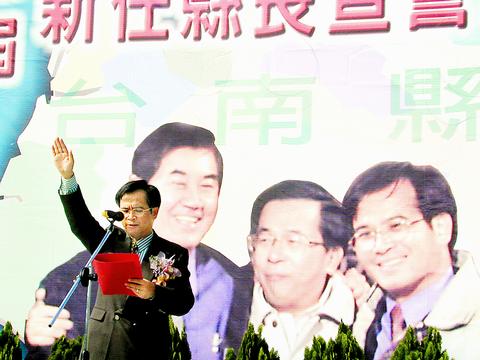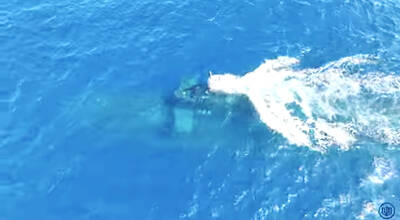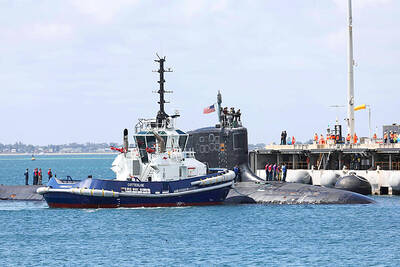The 23 county commissioners and city mayors elected in the Dec. 1 elections took their oaths of office yesterday. And in a sign of difficult times, most promised to boost their local economies.
The handover ceremonies were held under the auspices of the Ministry of the Interior in the requisite counties and cities across the country.
Taoyuan County's new commissioner, Chu Li-lun (朱立倫), said that he would deal with the top three problems he said Taoyuan residents are most concerned about: traffic, security and financial difficulties.

PHOTO: CHEN CHUN-SHENG, TAIPEI TIMES
He said that the Taoyuan County Government will bring more bus-inesses into the county and promised to shorten the application process to obtain permission to build plants in the county.
The new DPP commissioner in Chiayi County, Chen Ming-wen(陳明文), said that since Chiayi is primarily an agricultural region, his government will face tough challenges upgrading the sector to deal with Taiwan's entry into the WTO. He added, however, that "Crisis also means opportunity. I believe that if we cooperate with each other, we will meet the challenges."
The incoming DPP commissioner of Tainan County, Su Huan-chih (蘇煥智), made the same promise in his mainly agricultural county.
Su also promised to establish a biotech park and, like his predecessor Chen Tang-shan (陳唐山), "to bring business from all over Taiwan" into the county.
In Taipei County, re-elected DPP commissioner Su Tseng-chang (蘇貞昌) promised to improve the county's investment environment.
"I will spend every penny appropriately, strengthen the government's administrative efficiency, create more job opportunities and push for greater cooperation between the central and local governments," Su said.
In Miaoli County, independent Commissioner Fu Hseuh-peng (傅學鵬) proposed four goals for Miaoli, including building a university and developing technology, tourism and welfare.
In Hsinchu City, KMT Mayor Lin Cheng-tse (林政則) emphasized his social welfare policy, promising an increase in subsidies for the elderly and women's maternity allowances.
In Taichung City, outgoing mayor Chang Wen-ying (張溫鷹) said she hopes the newly elected mayor, Jason Hu, will help Taichung overtake Kaohsiung and Taipei to become Taiwan's "top city."
The DPP, which controlled 12 districts in 1997, won just nine city and county districts this time around. The KMT, which previously controlled eight counties, was victorious in nine districts.
Independent candidates and the People First Party captured two districts each, while the New Party took only Kinmen County.
Local heads have complained bitterly about their financial plight since the election. Many local government are heavily reliant on loans.
Premier Chang Chun-hsiung (張俊雄) promised at a meeting with all of the newly elected leaders last Sunday that the Cabinet will adopt measures to help them cope with their fiscal woes.
Emotional incidents, however, marred the ceremonies in Taoyuan, Hsinchu and Chiayi.
In Chiayi County, outgoing commissioner Lee Ya-ching (李雅景) failed to attend the handover ceremony for "personal reasons." In Taoyuan County, a county councilor heckled outgoing commissioner Hsu Ying-shen (許應深) during his speech and in Hsinchu County, the newly elected commissioner's supporters implored the outgoing commissioner, Lin Kuang-hua (林光華), to end his speech after he had spoken for over an hour.

CSBC Corp, Taiwan (台灣國際造船) yesterday released the first video documenting the submerged sea trials of Taiwan’s indigenous defense submarine prototype, the Hai Kun (海鯤), or Narwhal, showing underwater navigation and the launch of countermeasures. The footage shows the vessel’s first dive, steering and control system tests, and the raising and lowering of the periscope and antenna masts. It offered a rare look at the progress in the submarine’s sea acceptance tests. The Hai Kun carried out its first shallow-water diving trial late last month and has since completed four submerged tests, CSBC said. The newly released video compiles images recorded from Jan. 29 to

DETERRENCE EFFORTS: Washington and partners hope demonstrations of force would convince Beijing that military action against Taiwan would carry high costs The US is considering using HMAS Stirling in Western Australia as a forward base to strengthen its naval posture in a potential conflict with China, particularly over Taiwan, the Wall Street Journal reported on Saturday. As part of its Indo-Pacific strategy, Washington plans to deploy up to four nuclear-powered submarines at Stirling starting in 2027, providing a base near potential hot spots such as Taiwan and the South China Sea. The move also aims to enhance military integration with Pacific allies under the Australia-UK-US trilateral security partnership, the report said. Currently, US submarines operate from Guam, but the island could

RESTRAINTS: Should China’s actions pose any threat to Taiwan’s security, economic or social systems, China would be excluded from major financial institutions, the bill says The US House of Representatives on Monday passed the PROTECT Taiwan Act, which states that Washington would exclude China from participating in major global financial organizations if its actions directly threaten Taiwan’s security. The bill, proposed by Republican Representative Frank Lucas, passed with 395 votes in favor and two against. It stipulates that if China’s actions pose any threat to Taiwan’s security, economic or social systems, the US would, “to the maximum extent practicable,” exclude Beijing from international financial institutions, including the G20, the Bank for International Settlements and the Financial Stability Board. The bill makes it clear that China must be prepared

Taiwanese trade negotiators told Washington that Taipei would not relocate 40 percent of its semiconductor production to the US, and that its most advanced technologies would remain in the nation, Vice Premier Cheng Li-chiun (鄭麗君) said on Sunday. “I told the US side very clearly — that’s impossible,” Cheng, who led the negotiation team, said in an interview that aired on Sunday night on Chinese Television System. Cheng was referring to remarks last month by US Secretary of Commerce Howard Lutnick, in which he said his goal was to bring 40 percent of Taiwan’s chip supply chain to the US Taiwan’s almost